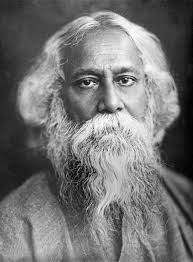Rabindranath Tagore
| Rabindranath Tagore | |
|---|---|

| |
| Rabindranath Tagore in the 1930s | |
| Born | 07 May 1861 |
| Birthplace | Calcutta, Bengal Presidency, British India (now Kolkata, West Bengal, India) |
| Died | 07 August 1941 (aged 80) |
| Place of death | Calcutta, British India |
| Resting place | Visva-Bharati University, Santiniketan |
| Nationality | Indian |
| Occupation | Poet, Writer, Composer, Philosopher, Painter |
| Years active | 1877–1941 |
| Known for | Gitanjali, Jana Gana Mana, Visva-Bharati University |
| Notable works | Gitanjali, The Home and the World, Kabuliwala, Chokher Bali, Jana Gana Mana |
| Awards | Nobel Prize in Literature (1913) |
| Spouse(s) | Mrinalini Devi |
| Children | 5 (including Rathindranath Tagore) |
| Parents | Debendranath Tagore (father), Sarada Devi (mother) |
| Religion | Hinduism |
| Website | Visva-Bharati University |
Rabindranath Tagore (7 May 1861 – 7 August 1941) was a legendary Indian poet, philosopher, painter, and composer, best known for authoring Gitanjali and writing the Indian national anthem, Jana Gana Mana. He was the first non-European to win the Nobel Prize in Literature in 1913 and is celebrated as one of India’s greatest cultural icons.
Early Life and Education
Born in a prominent Bengali Brahmo family in Calcutta, Tagore was homeschooled and began writing poetry at an early age. He briefly studied law in England but returned to India, where he became deeply involved in literature, music, and education. He later founded Visva-Bharati University in Santiniketan.
Literary Contributions
- Authored over 2,000 songs, numerous short stories, essays, and plays.
- His poetry collection Gitanjali brought him international fame.
- Wrote the national anthems of both India (Jana Gana Mana) and Bangladesh (Amar Shonar Bangla).
Educational & Social Reforms
- Founded Visva-Bharati University in 1921 to promote a holistic, international education system.
- Advocated for rural upliftment, self-reliance, and harmony through his writings and speeches.
Philosophy
Tagore’s philosophy combined Indian spiritual traditions with universal humanism. He believed in unity across religions, cultures, and national boundaries and often critiqued British colonialism in both subtle and direct forms.
Legacy
- First Asian Nobel laureate and one of the foremost figures of the Bengal Renaissance.
- Inspired freedom movements through his poetry and cultural revival.
- His birthday is celebrated annually in West Bengal as Rabindra Jayanti.

